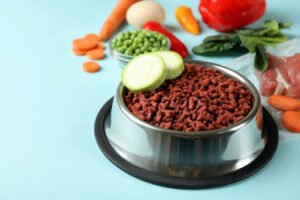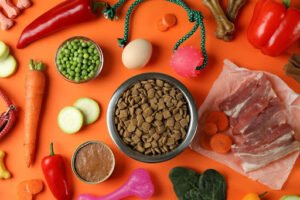
Like human beings, a balanced diet for dogs is crucial for them. Their dietary needs also change based on age, size, breed, and overall health. In this guide by Fetch & Feast, we’ll discuss everything about nutrition for dogs for their best health.
Nutrition for Dogs: Why Does it Matter?
Good nutrition for dogs is the foundation of their diet. A well-balanced diet provides essential nutrients that contribute to the following aspects of your dog’s health:
Longevity
A healthy diet adds years to your dog’s life by reducing the risk of chronic diseases and age-related issues.
Energy Levels
Nutrient-rich food fuels your dog’s daily activities and keeps them playful and alert.
Disease Prevention
The right diet helps prevent common issues like obesity, diabetes, and joint problems.
Skin and Fur Health
Fatty acids and vitamins make fur shiny and skin healthy.
Essential Nutrients for Dogs: Explained

Dogs require six essential nutrients for health, vitality, and optimal functioning. Let’s discuss:
1. Proteins
Proteins build and repair tissues, support muscle growth, and enable vital bodily functions like enzyme and hormone production. High-quality proteins should be present in your dog’s diet. Common protein sources include:
- Chicken: A lean, digestible option rich in amino acids.
- Beef: Offers protein and essential minerals.
- Fish: Packed with protein and omega-3 fatty acids that support skin, coat, and joint health.
- Eggs: A nutrient-dense, complete protein source.
- Lentils and Legumes: Plant-based options that can supplement protein needs, though they should be given in moderation and balanced with animal proteins.
2. Fats
Fats provide concentrated energy, aid in the absorption of fat-soluble vitamins (A, D, E, K), and contribute to healthy skin and a shiny coat. However, pet owners must focus on healthy fats to avoid excessive weight gain. Sources include:
- Fish Oil: Rich in omega-3s, beneficial for reducing inflammation and enhancing brain health.
- Flaxseed: Provides omega-3 fatty acids.
- Chicken Fat: Adds flavor while supporting overall energy levels.
- Salmon: Combines high-quality protein with important fatty acids for dual benefits.
3. Carbohydrates
Carbohydrates give dogs energy and help with digestion. Whole, unprocessed carbs are best for sustained energy release and minimal blood sugar spikes. Recommended carbohydrate options include:
- Brown Rice: Easily digestible and full of vitamins and minerals.
- Sweet Potatoes: A rich source of fiber, antioxidants, and natural sweetness.
- Oats: Gentle on the stomach, particularly good for dogs with sensitivities.
- Quinoa: A gluten-free seed rich in protein and nutrients.
4. Vitamins and Minerals
Vitamins and minerals help in immune function, bone strength, and overall health. These micronutrients often work together to support metabolic processes. Common sources include:
- Leafy Greens: Spinach and kale are excellent for providing iron, calcium, and vitamins A and K.
- Carrots: High in vitamin A, they support vision and skin health.
- Vet-Recommended Supplements: In cases where food alone doesn’t meet requirements, your vet may suggest targeted supplementation to fill gaps.
5. Water
Water is the most critical nutrient of all. Proper hydration supports digestion, temperature regulation, and cellular functions. Provide your dog with fresh, clean water every time, particularly after exercise or during hot weather.
Types of Dog Food
The pet food aisle is overwhelming but here’s how you can go about it:
Commercial Diets
- Dry Kibble: Affordable, convenient, and long-lasting. It’s also good for dental health as it reduces plaque buildup.
- Canned/Wet Food: More palatable and hydrating due to its high moisture content but often pricier and less convenient to store.
Raw Diets
The raw food diet includes uncooked meat, bones, and organ meats, sometimes paired with fruits and vegetables. While some owners swear by it, raw diets may pose risks like bacterial contamination and imbalanced nutrients. Always seek advice from a vet before switching to raw food.
Homemade Diets
Homemade diets give you full control over ingredients which is great for dogs with some dietary needs or allergies. However, carefully plan your dog’s plate under veterinary guidance for a nutritionally complete homemade diet.
Grain-Free vs. Grain-Inclusive Diets
Grain-free diets have gained popularity, but they might be linked to heart issues in some dogs. Unless your dog has a confirmed grain allergy, grain-inclusive diets are generally safe and beneficial.
Nutrition for Dogs Based on Life Stage

As dogs grow, their nutritional requirements change. Here’s what to consider to ensure proper nutrition for dogs:
Puppies
Puppies are in a growing phase, which means their diet needs to be rich in protein, calories, and nutrients like calcium and phosphorus. Puppy-specific formulas can meet these needs with:
- Higher protein content for muscle development.
- DHA (an omega-3 fatty acid) for healthy brain and vision growth.
- Adequate vitamins and minerals to boost immunity. Feeding schedule: Puppies eat around 3 to 4 small meals a day to accommodate their smaller stomachs and higher energy demands.
Adult Dogs
Once your dog reaches adulthood (usually between 1 and 2 years, depending on the breed), their focus shifts from growth to maintenance. Key factors include:
- Moderate protein and fat levels to sustain activity without leading to weight gain.
- Whole grains or fiber sources for digestion.
- Portion control according to their size and level of activity. Most adult dogs do well with two meals per day, spaced 12 hours apart.
Senior Dogs
Senior dogs (typically 7 years and older) may experience decreased activity levels and metabolic changes, requiring adjustments in their diet. Look for:
- Lower-calorie foods to prevent obesity.
- Added joint-supporting ingredients like glucosamine and chondroitin.
- Antioxidants to combat age-related cellular damage.
- Easily digestible ingredients for sensitive stomachs. Regular veterinary check-ups are important to monitor health and adjust dietary needs as they age.
Special Health Conditions
Certain health conditions require specific dietary changes. For example:
- Allergies or Intolerances: Hypoallergenic diets with novel proteins or limited ingredients can help.
- Obesity: Weight management formulas with higher fiber and lower fat content are ideal.
- Diabetes: Consistent meal times and low-glycemic foods help manage blood sugar levels.
- Kidney Disease: Diets low in phosphorus and protein can ease kidney strain. Consult your veterinarian to develop a diet plan as per your dog’s specific health needs.
How to Read Dog Food Labels?
Here’s how to make informed food choices for your dog:
Ingredient List
Ingredients are listed in descending order by weight. Go for quality proteins such as chicken, beef, or fish as the primary ingredient. Avoid generic terms like “meat meal” or “by-products” unless specified.
Guaranteed Analysis
This section provides the percentages of protein, fat, fiber, and moisture in the food. Compare these values to your dog’s specific dietary needs based on their age and activity level.
Nutritional Adequacy Statement
The product must have an Association of American Feed Control Officials (AAFCO) statement. So look for it. This confirms the food meets the minimum standards for a complete and balanced diet for a specific life stage.
Calories per Cup
Take care of the calorie content to manage portion sizes and avoid overfeeding or underfeeding.
Useful Tips to Choose Nutritious Food for Dogs

Consider Your Dog’s Needs
Think about your dog’s age, breed, size, how active they are, and any health issues they have. For example, a highly active working dog might need more calories and protein compared to a lazy one.
Consult a Vet
A professional can recommend specific brands or formulations as per your dog’s needs. For dogs with allergies, obesity, or other medical conditions, a vet-prescribed diet might be necessary.
Look for Quality Ingredients
High-quality proteins should be the primary ingredient. Avoid foods with excessive fillers, artificial preservatives, or vague terms like “meat by-products.” Whole grains, vegetables, and healthy fats are also beneficial.
Read Labels Thoroughly
Properly interpret the guaranteed analysis, ingredient list, and AAFCO nutritional adequacy statement (discussed above).
Monitor Your Dog’s Reaction
After introducing a new food, observe your dog’s energy levels, fur condition, and stool quality to determine if the food agrees with them.
Avoid Overfeeding
Feed based on your dog’s activity and weight. Overfeeding can lead to obesity, which shortens lifespan and adds to health problems.
Our Message on Nutrition for Dogs
Feeding your dog the right diet is one of the best ways to show love and care. When you take care of your dog’s nutritional needs, you can ensure your furry friend grows at every life stage.
Frequently Asked Questions (FAQs)
1. What is complete nutrition for dogs?
Complete nutrition for dogs means providing a diet that includes all essential nutrients like proteins, fats, carbohydrates, vitamins, minerals, and water in the right amounts. This keeps your dog healthy, energetic, and resilient against illnesses.
2. Which nutrients are essential for dogs?
Dogs require proteins, carbohydrates, fats, vitamins, minerals, and water. Proteins help build muscles, fats give energy, and carbohydrates help with digestion. Vitamins and minerals strengthen immunity and bones while water is vital for hydration.
3. How can I tell if my dog’s food is high-quality?
High-quality dog food lists real meat as the first ingredient, avoids fillers or artificial preservatives, and includes a guaranteed analysis. Check for an AAFCO statement to make sure it meets nutritional standards.
4. Should I give my dog grain-free food?
Grain-free diets are suitable only for dogs with specific allergies or sensitivities. Most dogs benefit from grains, which provide fiber and energy. Consult your vet before going for a grain-free option.
5. Can I feed my dog human food?
Some human foods like cooked chicken or carrots are safe for dogs, but many are harmful, such as chocolate, onions, or grapes. Always check with your vet before adding human food to your dog’s diet.